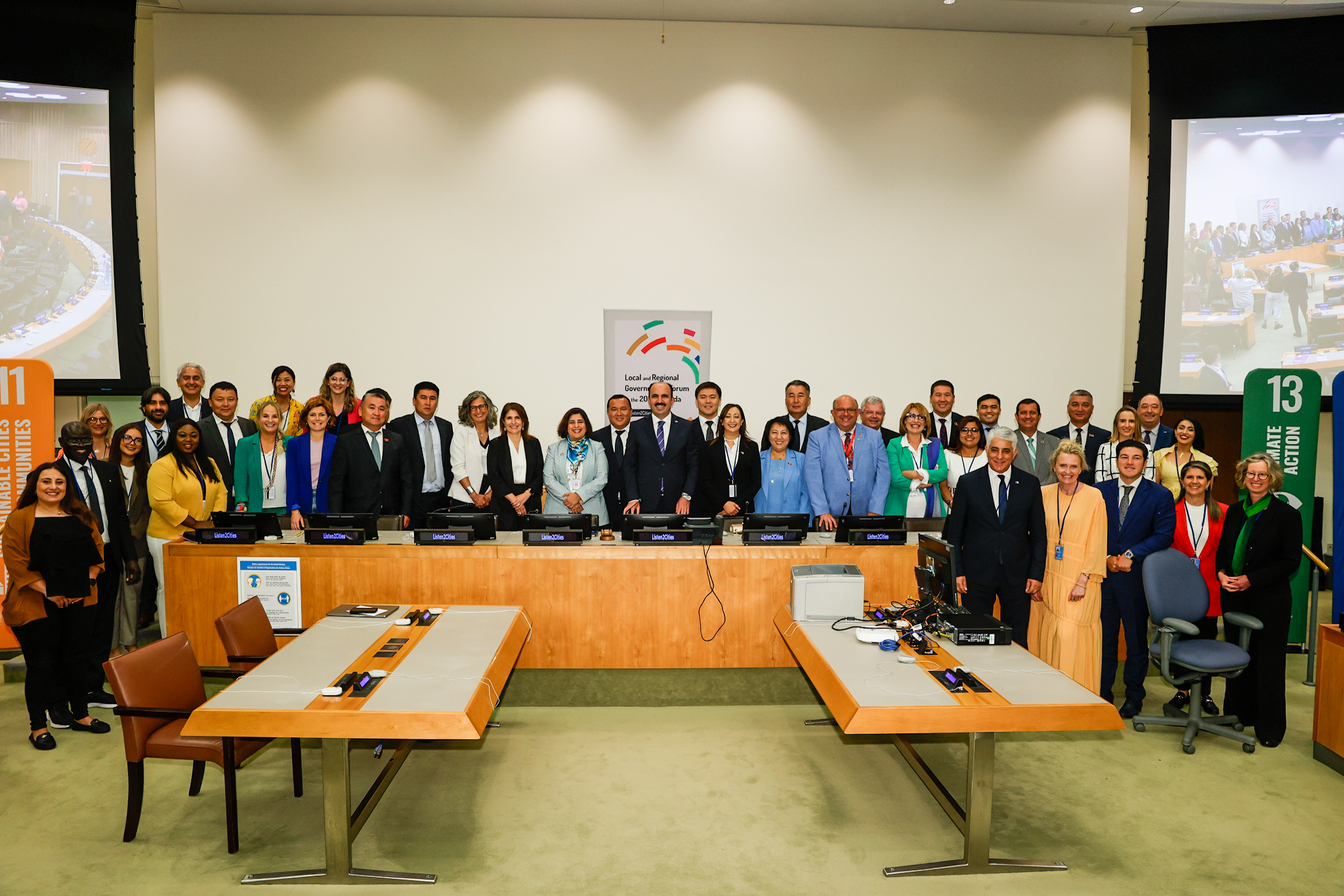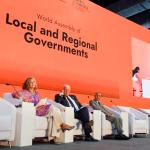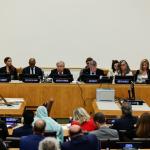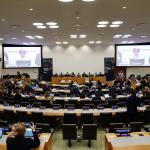
The local and regional government constituency gathered in the Global Taskforce of Local and Regional Governments (GTF) brought over 50 elected officials to the 2024 High-Level Political Forum on Sustainable Development (HLPF) from all regions and many networks of the GTF, including Regions4, ORU-Fogar, CLGF, ICLEI, CEMR, UCLG-Africa, UCLG-MEWA, FLACMA, UCLG-Eurasia.
The constituency presented this year a local track of activities and resources aimed at keeping localization at the forefront of the HLPF. Throughout the year, numerous initiatives contribute to this mission and align with the UN Secretary-General’s “to-do list” for rescuing the Sustainable Development Goals (SDGs). These actions include comprehensive reports, dynamic events, learning modules, and ongoing processes to advance the localization of global agendas.
The SDGs under review at the 2024 High-Level Political Forum (1, 2, 13, 16, and 17) were the guiding thread of the activities of our constituency. From the Local and Regional Governments Forum, to the constituency’s report to the HLPF, and including the publications and the participation of local elected officials throughout the HLPF, our engagement was geared towards showcasing the importance of local and regional governments in localizing equality, climate action and peace, and ensuring that they are understood as part of the same agenda.
Uniting for change: High-impact partnerships and engagement in official HLPF sessions
By strengthening our alliances with international organizations and the United Nations, Member States, civil society, academia, and more, our constituency has participated in key events and conversations to collectively rescue the SDGs to meet the needs of present and future generations. Following the presentation of the UCLG Decalogue on High-Impact Coalitions during the 2023 SDG Summit, we looked at the SDGs in review during the 2024 HLPF to bring about how local and regional governments are accelerating the 2030 Agenda by harnessing partnerships and multilevel cooperation to localize SDG 1 on No Poverty, SDG 2 on Zero Hunger, SDG 13 on Climate Action, SDG 16 on Peace, Justice, and Strong Institutions, and SDG 17 on Partnerships for the Goals. This aligns with our alliances and partnerships strategy for the last years and our advocacy efforts throughout 2024 and beyond, including on poverty at the last ECOSOC Partnership Forum in January, and the Commission on the Status of Women (CSW) in March, as well as the G20 and Urban 20 processes.
Following the SDG Summit last year and in the lead-up to the Summit of the Future in September 2024 and the Second World Summit For Social Development in 2025, the constituency’s advocacy efforts have been oriented towards building the case that local and regional governments are committed to localizing the 2030 Agenda and are indispensable political actors in global governance, with multilevel governance at the center of transformative action. This is our collective statement on the vital need to forge wider alliances for accelerated progress – a call to expand partnerships as we stride into the second half of our journey to 2030.
This year’s HLPF also reaffirmed the consistency of the GTF’s partnership with the UN agencies and programmes responsible for monitoring the SDGs. This was showcased throughout the recurrent presence of the UN agencies’ principals in different moments organized by the GTF or co-organized with us. Likewise, the GTF proved to be an enduring partner in the UN agencies’ events. It included the participation in GTF events, amongst others, of H.E. Paula Narváez, President of the Economic and Social Council (ECOSOC); UN-Habitat’s Designated Executive Director Anacláudia Rossbach and Acting Executive Director Michal Mlynár; and UNDP Administrator Achim Steiner. Among the Member States of the United Nations, Spain and Brazil reaffirmed their commitment to SDG localization and partnerships with our constituency. Finally, the President of UCLG and Mayor of Konya, Uğur Ibrahim Altay, and the UCLG Secretary General Emilia Saiz, also met with UN Deputy Secretary-General Amina J Mohammed to discuss the role of the constituency of local and regional governments in localizing the six SDG transitions, and the role of local and regional governments in the lead up to the Summit of the Future and the World Social Summit.
Local and Regional Governments Forum
The Local and Regional Governments Forum (LRGF) on the 2030 Agenda is the political space of our self-organized constituency at the HLPF. Co-organized with UNDESA, UN-Habitat, UNDP, and Local2030, the LRGF serves as a living proof and testament of the unwavering commitment of local and regional governments with the 2030 Agenda. This year, the LRGF illustrated the interconnected importance and breadth of local action and governing in partnership to power the SDG Rescue Plan, and its connections with other major global political processes and milestones, such as the Summit of the Future, to be held in September 2024, and the Second World Summit For Social Development, to be held in 2025. A special focus was given to the five SDGs under review in the 2024 HLPF, delving into their effective implementation through multilevel cooperation.
Mayors and governors from all world regions took the stage at the LRG Forum to deliver the commitments of our constituency to localizing the SDGs under review. The session was chaired by the Mayor of Konya and the President of UCLG. Uğur İbrahim Altay, who called on the international system and national governments to ensure the political participation of all communities in order to rebuild social cohesion and localize the unciersal development agendas. The three main segments of the Forum were chaired by Mayor of Kitchener and Copresident of UCLG Berry Vrbanovic; and Fatiha El Moudni, Mayor of Rabat and Treasurer of UCLG.
The strong partnership between the constituency of local and regional governments and UN Agencies was reflected in the Forum , Together with H.E. Paula Narváez, President of the Economic and Social Council, the session counted on the participation of of Michal Mlynár, Assistant Secretary-General and UN-Habitat Acting Executive Director; Lotta Tahtinen, Chief, Outreach and Partnerships Branch, Division for Sustainable Development Goals (DSDG), Department of Economic and Social Affairs (DESA) ; and Shoko Noda, Assistant Secretary-General and Director of the UNDP Crisis Bureau, who supported the commitments displayed by local and regional governments and the importance of a transformed mulitlateral system.
The Forum was also symbolized the importance of multilevel dialogue between spheres of governments. with the Minister of Social Affairs of Indonesia Tri Rismaharini; the Minister for Territorial Cohesion of Cabo Verde, Janine Tatiana Santos Lélis, and the Vice Minister of Planning of Honduras, Ana Karen Vallecillo, together with representation from national governments of Brazil and Italy. The Spanish National Government, represented by the GGeneral Director of Sustainable Development Policies Sergio Colina Martín, delivered an update onj the Fourth International Conference on Financing for Development, and the importance of subnational engagement in the process.
The first panel was themed around the need for a renewed global social agenda to end hunger and poverty and foster social inclusion. Eider Inunciaga, Councillor of Bilbao, presented the commitment of the constituency to “ as governments closest to the people and first responders in crises, are committed to ensuring equitable opportunities for all communities, with special attention to gender needs. This includes universal access to public services”. The panel counted with the participation of Ababacar Kalifa Ndao, President of the Department of Dagana; Richard Calderón, Prefect of Imbabura, Representative of CONGOPE (Ecuador): Vítor Aleixo, Mayor of Loulé, and Chairman of SDG working group of the National Association of Portuguese Municipalities : Dimitris Kafantaris, Municipal Councillor of Pylou-Nestoros, Secretary General of Central Union of Municipalities of Greece (KEDE), and Bernd Vöhringer, Vice-President of the Congress of Local and Regional Authorities of the Council of Europe
The second panel addressed the localization of the climate agenda and the need for high ambition partnerships for climate action: achieving the ecological transformation and accelerating NDCs. The commitment, delivered by Clare Hart, Vice-President of Montpellier Méditerranée Métropole, relayed the dedication of our constituency to “ expanding multilevel and multistakeholder alliances for transformative climate action. We are committed to supporting the Coalition for High Ambition Multilevel Partnerships (CHAMP), to respond collectively to the need for mitigating the climate emergency.”
Ravi Bhalla, Mayor of Hoboken; Manfred Armando Antonio Reyes Villa Bacigalupi, Mayor of Cochabamba; Nicole Unterseh, Deputy Mayor of Bonn; Axel Schmidt Grael, Mayor of Niterói; and Marcelo Metediera, Mayor of Canelones (Uruguay) were the representatives of our constituency that addressed the importance of localizing SDG 13 throughout the panel.
The final segment of the session saw our constituency deliver a statement on the importance for multilevel and multistakeholder cooperation to localize SDG16. Elisenda Alamany, Vice President of the Metropolitan Area of Barcelona, relayed our commitment to “ working together with other spheres of government and stakeholders towards the localization of SDG 16, in particular within the development of the New Agenda for Peace and the renewal of governance” with a focus on youth participation. Issa Kassis, Mayor of Ramallah; Kelvin Cruz Cáceres, Mayor of La Vega and President of the Dominican Federation of Municipalities; Kuvanychbek Kongantiev, Chairman of Bishkek City Council; and Jose Leonardo Orlando Arteaga, Prefect of Manabí, Representative of CONGOPE were the local and regional representatives that addressed the localization of goal 16 to guarantee safer and more democratic cities and regions.
The final segment of the Forum saw the governor of Moquegua and the Chief, Urban Practices Branch, UN-Habitat Shipra Narang Suri address the importance of having all stakeholders on board to achieve the localization of the goals. Representatives of the Global Taskforce of local and regional governments closed the session by relaying the key elements of the Statement of our Organized Constituency to the 2024 HLPF, underscoring our commitment to achieving the universal development agendas, and highlighting the importance of multilevel action and localization to achieve the Global Goals.
Local2030 Coalition Special Event
The constituency had a significant role at the Special Event “Unlocking transformative change through the localization of the six SDG transitions”, organized by the Local2030 Coalition, a UN-wide multistakeholder initiative to mainstream SDG Localization. The Global Taskforce is part of its steering committee, along with other local stakeholders and UN agencies.
Building on the last SDG Summit, when Local2030 was identified as a High-Impact Initiative for Localization, the session focused on strategies for localizing the six SDG transitions and catalyzing innovative financing mechanisms. Discussions emphasized the importance of multi-stakeholder and multi-sector collaboration to trigger ambitious action at scale and connect the localization of the 2030 Agenda with other major milestones such as the Summit of the Future, the Fourth International Conference on Financing for Development, or COP30.
Among the key participants of the session we can highlight Fatiha El Moudni, Mayor of Rabat and UCLG Treasurer;Claudia Salazar Hurtado, Vice President of the Network of Councilors of FLACMA; Francine Farrugia, Councillor of Siggiewi and member of the CEMR / PLATFORMA Young Elected Officials Committee; Michal Mlynár, UN Assistant Secretary-General and Acting Executive Director of UN-Habitat, as well as representatives of Spain, Brazil, and FAO (current co-chair of Local2030).
Launch of the 8th Towards the Localization of the SDGs Report
The annual report of the Global Taskforce of Local and Regional Governments, Towards the Localization of the SDGs, showcases the state of SDG implementation at the local level around the world, and has been produced and presented to the HLPF every year from 2017 to 2024. Based on a total of 196 responses from LRGs and their associations from 70 different countries, this year’s report provides an analysis of the remarkable initiatives undertaken by LRGs to localize the SDGs as well as of the still-to-be strengthened LRGs’ involvement in national coordination and reporting processes.
With a focus on the SDGs under review at the 2024 HLPF, this report shows how these SDGs are unquestionably connected and calls for the essential acknowledgement of the significant role of local and regional governments in addressing complex issues such as poverty, climate inaction and violence. The three working papers developed in tandem with the full report place the focus on the work of local and regional governments in localizing SDGs 1 and 2; SDG 13; and SDG 16. This year’s report leverages our strategic partnerships with ICLEI and Pathfinders - NYU-CIC. In a clear effort to interlocute with global reports such as the 2023 Global Sustainable Development Report (GSDR), the report’s process benefitted from a consultation with the scientists behind the 2023 Global Sustainable Development Report (GSDR).
The Report was presented in a session that counted on the participation of local and regional leaders, including Berry Vrbanovic, Mayor of Kitchener and UCLG Copresident who presented the outcomes of the Report, Bernadia Irawati Tjandradewa, UCLG ASPAC Secretary General; Eider Inunciaga, Councilor of Bilbao; Ravinder Bhalla, Mayor of Hoboken, and Daniel Sazonov, Deputy Mayor of Helsinki, who each delved into the papers on SDGs 1 and 2; SDG 13; and SDG 16 respectively.
UNDP Administrator Achim Steiner opened the session, commending the partnership between the agency and UCLG and the Global Taskforce of Local and Regional Governmetns. He further acknowledged the potential of local and regional governments to overturn fear adn bring hope, restoring trust and shaping reality to deliver extraordinary things. Director of the Human Development Report Office of UNDP Pedro Conceição presented the UN Human Development Report, and its findings on political polarization, speaking directly to the conversations around the localization of SDG16, as well as the need to pay attention to the people being left behind to prevent its escalation.
The Global Alliance for Care, Pathfinders - NYU-CIC, and the Ministry of Cities of Brazil responded to the message of the papers and relayed the importance of empowering the youth; integrating national and local planning; and placing care at the centre of a renewed social contract.
Based on 196 responses from LRGs and their associations across 70 countries, including 15 reporting to the HLPF in 2024, this year’s GTF report highlights the need for stronger LRGs involvement in national coordination and reporting processes, with a focus on the 37 countries presenting Voluntary National Reviews (VNRs) this year. Amongst others, it shows that the pace of LRGs’ involvement in national reporting processes, including Voluntary National Reviews (VNRs), and national coordination mechanisms for SDG implementation is too slow to achieve the SDGs. In 2024, 59% of the countries producing a VNR reported medium to high levels of LRG involvement, and 55% have involved their LRGs in one way or another in their national coordination mechanisms. This, however, also means that half of the world's countries do not have permanent, consolidated structures and processes for LRG involvement in SDG achievement.
Six years ahead of the 2030 deadline, broad acknowledgment and urgent action are needed to leverage the role of LRGs in accelerating sustainable development and addressing global challenges at the grassroots level. On a positive note, the report is increasingly recognized by a wide array of stakeholders as a critical research and advocacy tool directly shared by our constituency to make the case on SDG localization. Throughout the HLPF, representatives from institutions such as the UN, OHCHR and the OECD acknowledged its importance and made use of its findings.
Local and regional governments in the 2024 Ministerial Declaration
The Ministerial Declaration of the 2024 High-Level Political Forum includes key mentions to the importance of local and regional governments both in the localization of the 2030 Agenda, as well as to their importance in building a strong social agenda from the bottom-up.
The localization of the SDGs is recognised as an important contribution to the achievement of the goals, and the chapeau of the Declaration commits to enhancing multilevel and multistakeholder partnerships to achieve the SDGs, paving the way for a stronger involvement of not just local and regional governments, but also of civil society, academia, the private sector and the youth.
Empowering “local organizations”, as it is framed under the Declaration, is also a critical element of the achievement of Goal 17, and thus unlocking the partnerships for the goals and strengthening the implementation of the 2030 Agenda.
Finally, a bold mention is made to empowering subnational reporting, through the involvement of local and regional governments in the design and implementation of voluntary national reviews, as well as to enable and strengthen the production of Voluntary Subnational Reviews.
The Ministerial Declaration highlights the importance of scaling up and improving access to finance, a decisive issue for our constituency, which is calling for large-scale transformations of the current financial systems to respond to global challenges and deliver the common goods. In particular, ahead of the 4th Conference on Financing For Development, in which we aim to rally our movement to ensure the funding of local public service provision, and closing the financial gap.
The Ministerial Declaration acknowledges -though in a minor way- the importance of local and regional governments in meeting the “nutritional needs” of local communities, as well as in developing technologies to prevent food insecurity.
While the Declaration recognizes the role of local and regional governments and partnerships for the implementation of the Goals, it fails to acknowledge our role as political actors in the design and development of policies aimed at advancing the 2030 Agenda.
In addition, the Declaration fails to highlight the role of local and regional governments in the struggle against climate change, as well as in enabling disaster risk reduction strategies and combatting desertification. The potential of multistakeholder partnerships (such as CHAMP) is hinted at, but never fully mentioned. A similar missed opportunity is found in how it addresses the achievement of SDG 16, for which it neglects to mention the local sphere in reducing violence, promoting peace through community-building strategies driven by local public service provision, or enabling access to justice. The potential of city diplomacy and subnational efforts to achieve peace are also nowhere to be found in the Declaration
Overall, the promising steps forward of the Declaration outweigh its shortcomings, and it is refreshing to find critical mentions to localizing the SDGs and to enhancing multistakeholder partnerships for the goals, which we understand as the baseline to accelerate localization and leaving no-one and no place behind as we count down to 2030.
Towards the Summit of the Future and the World Social Summit:
- The UN Secretary General Advisory Group on Local and Regional Governments
As we gear towards the upcoming Summit of the Future, the HLPF was also a space to present the progress of the UN Secretary General Advisory Group on Local and Regional Governments, which gathers 15 local governments gathered around the Global Taskforce, and five representatives from Member States, to provide recommendations to the UN Secretary-General to ensure the local perspective is listened to ahead of the Summit and promote a more inclusive, networked and effective multilateral system. This progress includes promoting a call to define a separate and differentiated status for LRG within intergovernmental processes that is now part of the Pact for the Future second revision.
The Summit of the Future will see the third and final meeting between the Secretary-General and the Advisory Group, which will serve to present their final report, including providing high-level political commitments, local actionable solutions for present and future generations, and multilateral strategies for implementation of all the global development agendas within the framework of the 2030 Agenda.
- Beyond the Summit of the Future
The Summit of the Future and the World Social Summit are part of the same process towards a reinvigorated multilateral system in which all the global development agendas are acknowledged and implemented as one, involving all spheres of governance. For the self-organized constituency of local and regional governments together with its partnership ecosystem, these two milestones are to be crucial moments to galvanize a multistakeholder, multilevel coalition that delivers in the challenge of bringing about a global social agenda that, driven by local public service provision, puts reducing inequalities at the center of a new social contract to be delivered within the framework of a renewed multilateral system that is fit for purpose to address the needs and aspirations of current and future generations.
Read more on the events that different networks were engaged in here
Visit the Flickr album to see all of the images of the Forum




